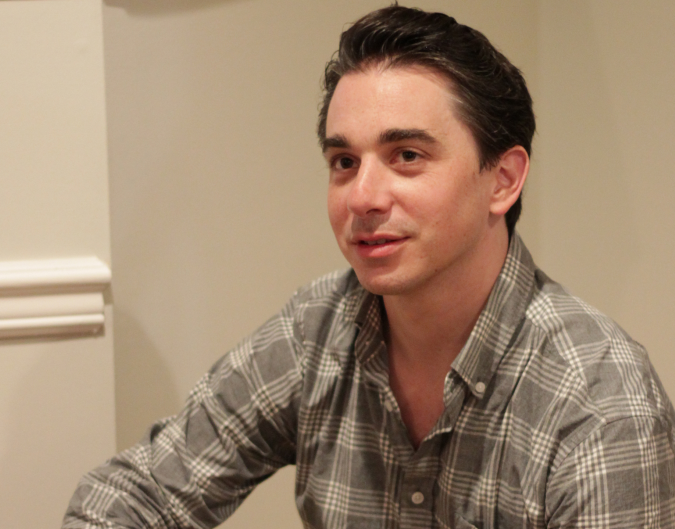
Katelyn DurstIn this season of tumult and deep psychic unrest for our country, it hardly seems a coincidence that I'd been pondering bringing in new interviews with poets whose work is inseparable from their activism. Incidentally I'd also been aiming to feature younger voices. By the time of our interview, Katelyn Durst had impressed me not just with her poems of struggle and identity and longing and resilience, but her highly visible and participatory commitment to the social justice that inflames her writing. From a distance of months – I'd interviewed Katelyn back in August – it occured to me while putting together this post that "Curl" is not merely a poem about race or identity, but love. Self-love of the kind Katelyn embodies here, a kind that is so easy to forget in times such as this: just one gift of the many which poets can offer as utterances of comfort in a hurting world. – HLJ
===
So you and I first met at Grunewald Guild back in May, and I was sitting with you in the lounge area by the kitchen, and you read me this poem and I remember thinking, “this girl is fearless.” Tell me a bit about this piece – what began it for you and how you wrote it.
It’s so great to hear that, because the truth is I often feel afraid. This poem came out of a homework assignment that was given to an international baccalaureate (IB) 11th grade English class I was TA-ing for this school year. The teacher assigned the poem "Girl" by Jamaica Kincaid, and the poem really resonated with me, with its fractured repetition. If there’s one thing people talk to me a lot about, it’s my hair. So I went home and wrote down the things I remembered people saying to me about it – as it turns out, they were overwhelmingly negative and hurtful things – and wrote them verbatim into what eventually became this poem.
===
CURL
Straighten your hair just once. Blow dry it or somethin’ and it will be down to your shoulders. Fix your hair. Tie back your hair. Wear a hat over your hair. I knew that was you because of your big hair. Your hair looks like the Medusa’s snakes. Why do you have just one dread lock? Can you go back and look in the mirror. Sit still while I’m braiding your hair. Sit in this chair so I can see the top of your head. Sit outside so that your hair doesn’t get all over the kitchen floor. How do you make black hair look so nice? You should straighten it. Texturize it. Don’t brush it. Brush it with just your brown fingers. You need to buy an actual brush and a comb. Your hair is so dry it would soak up a whole tub of moisturizer. Your hair is so big. Wow, your hair is so beautiful. Can I touch your hair? Have you ever washed your hair? Is that your real hair? Can you do that to my hair? You should straighten your hair. The back of your head is a kitchen. Twist out your hair by sectioning out single sections and twisting small parts of hair together, like a two-strand braid. Make the twists stretch around your head andwear a silk cap at night to help your kitchen from getting poof or static. Long bouncy curls are cute. I saw a guy who had hair like you, so I assumed he was homeless. Men don’t like curls; they don’t want their hands to get stuck when they run their fingers in your hair. Straighten your hair. Natural is the new black, get your weave here. Put flowers in your hair. This hay will never come out of your hair. You have paint in your hair. That braid makes you look like Pocahontas. Cornrows make you look like a boy. Long braids and gym shorts make you look like a boy. Put curlers in your hair to get a more succinct pattern. Bantu knots. Sculpted Afro. Jerry curls. Did you wake up like that? The less black you look, the less likely you are to questioned by police. Don’t put wool hats on your hair, it will mess up your kitchen. How to get your most defined Wash N Go. How to make DIY Clay Wash. How to make natural, black, curly hair look elegant: Pin it up. What’s wrong with your hair? Why does your hair stick up like that? Your hair looks like a lion’s mane. Are you from Africa? Are you from India? What are you? You look like you just got here. I can’t wait to get home and see your beautiful curls...Daddy. Here is a link to several different wigs you should try. It will make you look much prettier. Straighten your hair. Just get your hair wet so it doesn’t look so dry. Is that a stick in your hair? Do you have green beetles in your hair like Bob Marley did? What kind of hairstyle is that? The straighter your hair, the more likely you are to succeed. So, just sit still. Let this heat press away your curls, your kitchen, your blackness. Let it warm you like the love you are sure to soon have.


